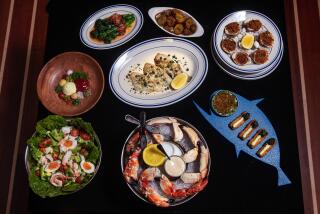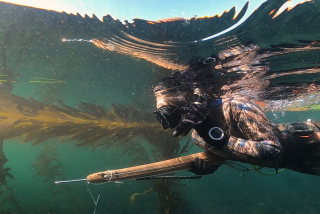At Sea With the Codgers : Age of Aquarius and Its Anglers Is Unimportant as ‘Codfather’ and Friends Go Deep
- Share via
Jimmy La Sane turned the handle on his reel slowly, methodically. He cranked, and cranked and cranked . . . Finally, when the sun was a little higher in the sky, when everyone was a little older, La Sane’s catch came into view--an orangish-pink blimp of a fish called a cow cod, which until Monday had been living in the deep, dark depths off Malibu.
The “Codfather” had struck again.
That’s what La Sane calls himself, anyway. The 63-year-old retired actor-musician from Long Beach spends nearly every Monday rocking and reeling on the Aquarius, Malibu Sportfishing’s lone vessel.
The Aquarius is an old wooden craft that isn’t very fast and doesn’t go very far, but it has plenty of character. Especially on Mondays.
That’s when La Sane, Sam Charles, Edwin Hicks and several others board, as they have been doing every week now for years.
“A lot of these people are like grandfathers to me because I’ve known them longer than I’ve known my grandfather,” said Phil Campanella, 46, owner of the landing at the end of the Malibu Pier.
With them aboard the Aquarius, owner-skipper Jon Christensen leaves the bass and halibut behind and travels four or five miles offshore, where the ocean’s bottom drops off and an entirely different world is available to his customers--the world of the cow cod, the chilipepper and chucklehead, the vermilion and the salmon grouper, and numerous other rockfish that thrive in the cold, deep water off the coast.
None are true cods, but the term rock cod is generally applied to many of them, and “rock cod trips” have become a fall and wintertime mainstay of fleets along the coast.
The Monday trip aboard the Aquarius has become a little bit more.
“The Monday rock cod trip is kind of like a men’s club--everybody knows each other,” said Charles, 66, a retired salesman and a fixture at the starboard bow on Mondays.
Club Cod, it could be called. Its members, though they come from all walks of life, all come equipped with the same tools of the trade--100-pound Dacron line spooled on a giant reel with an oversized crank.
And although it was impossible to tell on the most recent outing, during which a cool wind kept the codders in long sleeves, all of them probably share a similar physical characteristic--having one arm bigger than the other.
After all, each of the anglers spends the better part of every Monday cranking up a lead sinker the size of a sash weight attached to a line bearing anywhere from five to 15 hooks from depths of 500-1,000 feet. And more often than not, there are large fish caught on those hooks.
“The most I’ve taken in one haul was nine,” said Charles, having just brought in a small haul of two salmon grouper, an orangish bass-shaped fish known to swim as deep as 1,500 feet.
If rockfish put up any kind of a fight, such feats would be next to impossible.
They attack their prey--squid, shrimp, crabs and small fish--with a vengeance. But they give up not long after their death rides to the boat begin, managing a few shakes until the change in pressure causes their air bladders to fill and their eyes to bulge. Then they come up like balloons.
Which is fine for the Monday bunch on the Aquarius.
Like all rock-codders, they don’t much care for sizzling runs and burning drags, or for the intensity associated with a “hot” surface bite of, say, yellowtail or tuna.
Rock-codders are a breed apart. They prefer the slower pace associated with their sport and the sure thing. And rock-codding is as close to a sure thing as it gets.
“You catch a lot of fish, man,” said Dan Lula, 24, one of the youngest regulars on the boat.
Indeed it is not difficult to load up on some of the finest-tasting fish the ocean has to offer.
Cow cod, rarely caught in water less than 300 feet deep, is one of the most prized of the rockfish. It is also one of the largest, measuring up to three feet long and nearly as round. Its flesh is considered excellent in taste and texture, and some processors market the fish as sea bass.
Lingcod are rarely taken on the Aquarius, but when one comes over the rail, news spreads from stern to bow. One of the ugliest creatures in the sea, the sharp-toothed lingcod is also one of the most popular, despite its green flesh, which comes out of the oven snowy white.
Chilipeppers and chuckleheads are much smaller than cow cod and lingcod, but more prevalent and nearly as tasty.
So are boccacio, or salmon grouper, the most commonly caught fish aboard the Aquarius. Salmon grouper are considered as delectable as the rest, but have a reputation for being “wormy.”
Wormy or not, salmon grouper fillets are packed off the Aquarius by the hundreds every Monday afternoon. Christensen’s best day in his 15 years at the helm was years ago when all 65 people--he carries fewer people these days--sacked their 15-fish limits. “They caught almost 1,000 fish in only a few hours,” he said.
These days, limits are harder to come by but for some the catch is only a bonus to being out in the fresh air on the water with friends, engaging in friendly competition.
“I come out here to relax,” said La Sane, spitting the shell of a sunflower seed into the sea.
Hicks, 56, is a retired Compton policeman who now operates a facility that counsels abused and troubled youths.
“All of my jobs have been somewhat stressful and this is relaxing,” he said. “Even if I don’t catch anything, I consider fishing a good day.”
Charles does too. But he never likes to go home empty-handed. His cats would never forgive him.
“One of them is an alley cat that weighs 23 pounds,” Charles said. “And I’m not kidding, he eats well over a pound of fish a day.”
And despite the lack of fight by the targeted species, and the fact that rock-codders use fishing rods that are practically unbendable, there is some sport involved.
Said Christensen, watching his meter for signs of life on the bottom. “(The fishermen) know when they’re getting fish; they can feel ‘em. They don’t do it just for the fish because they don’t need ‘em. I mean how many fish can you eat?”
Christensen found what looked to be a good place to start a drift and instructed the anglers to drop--and it immediately became apparent that it pays to be quick but careful when tossing a five-pound weight and a string full of hooks over the rail.
One angler snagged a hook on the eye of his rod and minutes passed before he got the mess untangled. By the time he got to the bottom, the boat had drifted past the fish. Another angler a week earlier caught a hook in his finger and spent several painful minutes trying to remove it.
The experienced anglers knew the difference between bites and rocks. Others had no clue, getting hung up on the rocks and losing their weights, which cost nearly $5 apiece.
Some, such as Charles and La Sane, were “scoping,” or keeping their reels in free-spool and letting out line as the boat drifted to keep their baits near the fish. Others chose to keep their reels in gear, covering more of the bottom but getting fewer takers. The scopers out-fished the non-scopers, three to one.
On the first drift, Hicks, on the starboard rail, caught an eight-pound lingcod, which he was sure would win him the cash jackpot awarded by the group for the top catch of the day. At the stern, Darolynne Aird reeled in a huge salmon grouper, one of the largest taken on the Aquarius this year.
“I was hung up on the bottom, but I felt this thing shaking,” she said. “I knew I had a big fish.”
Being a crew member, she wasn’t eligible for the jackpot, a fact many pointed out as they cranked on their strings. Many of the hooks bore only the squid that had been sent down to attract the fish. Others had only one or two fish and some had as many as four.
Christensen had no explanation for what he called an extremely slow day, other than that there were lots of baitfish in the area, meaning the rockfish had probably had enough.
Still, more than 60 fish--mostly salmon grouper--were brought aboard before it was time to quit. And as the Aquarius turned and headed to the pier, a small crowd gathered for the weigh-in at the stern.
Hicks’ lingcod didn’t stand a chance. It was nearly flung from the scale when deckhand Victor Waser hung a hefty cow cod on the other end. A cow cod caught by none other than the Codfather.
More to Read
Sign up for The Wild
We’ll help you find the best places to hike, bike and run, as well as the perfect silent spots for meditation and yoga.
You may occasionally receive promotional content from the Los Angeles Times.






